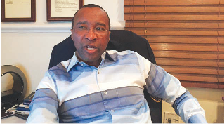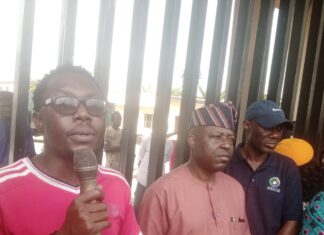Roland Iyayi, Top Brass Aviation Chief Executive Officer and former Nigerian Airspace Management Agency (NAMA) Managing Director, believes policy somersaults hinder the growth of the industry.
But he reiterates in this interview with Special Correspondent, Nkem Osuagwu, that aviation has the potential to make huge contribution to Gross Domestic Product (GDP).
NCAA and growth triggers
The job of a regulator is oversight of the industry to care for the operators and ensure they are capable. My understanding is that if you licence an operator, you tell him that this licence authorises you to operate.
Top Brass is licensed as a non scheduled operator and we carry AOC number two of the new certification process and were the second airline to be certificated in the new category by the NCAA (Nigerian Civil Aviation Authority) in 2011.
Our focus is on charters and contracts. If the NCAA is to uphold those tenets, I need to be told why it is ok for a schedule operator to pull out of scheduled service an aircraft that is programmed for such for upwards of 13 months without any repercussion to explore contracts that have been defined specifically for a non schedule carrier.
Besides, a scheduled operator can do charters but that presupposes that it has in its fleet a 10 per cent surplus capacity which is a requirement enforced on federal carriers.
The NCAA purview is to ensure that the carrier upholds regulations but if the NCAA is going to look the other way without regulation and not ask questions about a carrier that pulls away under their nose for 13 months without any question asked, it means it is like a jungle out there and anybody can do anything and walk away with it.
If commercial airlines are doing what they are supposed to do, the sector won’t be in this serious state. And what is the implication for the policy somersault of former Minister of Aviation, Stella Oduah, and her successor, Osita Chidoka?
Again, we have over the years seen policy somersaults and this has brought distortion to the market. Over the years, we have seen distortion in the market because of policy inconsistency.
And when you have distortion in the market you may not feel that the larger economy is suffering big time and people are lamenting and asking why aviation in Nigeria contributes only 0.4 per cent to GPD.
I am currently doing my doctorate degree in aviation. If we take a look at Brazil, which I have studied extensively, we see that there is need to embrace deregulation, liberalisation.
When reform is tied to a disconnection in the overall economy you create more harm to your economy. We had partial deregulation of the industry in 1985. Nigeria Airways then had a monopoly and it was well equipped to operate the domestic market.
If the government deregulated to ensure better consumer satisfaction, which informed deregulation worldwide, how come that 20 years down the line those benefits have not manifested?
Where is that disconnection?
Nigeria Airways did not prepare for deregulation and could it have done that? It is an ongoing thing for ever. Nigeria Airways did not re-equip. I was privy to what happened because I was part of the system then.
It got to a point when we said Nigeria Airways was owing money but nobody looked at it. They did not allow it enough time to respond to the new market. So, we had the likes of Okada and others which brought in all these airplanes that were not necessarily good to sustain the longevity of the industry because they were affordable and all of a sudden we had a lot of new airlines.
If you bring in an old airplane to operate, it is cheap to buy but invariably you are paying very high to maintain it.
When Nigeria Airways was liquidated, it had more assets than liabilities. The asset base of Nigeria Airways was over $500 million. Now we have liquidated Nigeria Airways and we have other players in the industry. The other players do not have the solid foundation which Nigeria Airways had.
All the airlines in the country today are in a war of attrition. Lagos, Abuja, and Port-Harcourt account for 80.2 per cent of air travel. They are the business triangle of Nigeria.
The airlines have thrown so much of their capacities into these three markets, where there is a deep ticket competition.
They cannot break even. If you look at the operating economics of each of these airlines, the type of aircraft they operate, their overheads; their exposure financially, they can’t practically be profitable.
For as long as we have airlines thinking how to hold on to market share, throwing in frequencies there will be a major problem. That is where we are today. That war of attrition is not helping the sustainability of the industry.
Policy implementation
There have been policy somersaults, policy inconsistency in terms of implementation. Airlines here are like big bubbles ready to burst.
People were saying AMCON (Asset Management Corporation of Nigeria) has come to rescue the airlines. The government talked about providing funding for the airlines. It was a time the airlines were in the negative. Money provided by AMCON was used to buy debts, not adding growth.
They gave airlines a new lease of life to continue to create distortions in the market. The almost N200 billion expended through AMCON to airlines was money down the drain. Could it have been done differently? I believe so.
How to ensure growth in the industry
Again, it boils down to policy. The United Arab Emirates (UAE) 25 years ago took a conscious decision. Dubai was not a destination, it was planned. They looked at it and said, look, we have oil but for how long can we depend on oil?
They said they need to develop something else to build their economy around and decided that Dubai should be made a destination and the financial capital of the world.
Dubai is pretty much like in the centre of the world because from Dubai to the East, to the West, it is about the same time. It gave them competitive and strategic advantage to launch Emirates from there to anywhere in the world.
What was the model they needed to develop Dubai into a huge hub? People fly through Dubai without stepping out of the airport, and you spend. They moved the entire economy around the airport. It was a deliberate policy.
Can it work in Nigeria? Yes, it is possible, but how do you do it? You must have policy direction, set the objective. Having set the objective, you can say let us see what role aviation would play and how we can use it to sustain that model into the future.
That is what Dubai has done. Nigeria had Lagos as a strategic hub that can be developed for the entire region but we have not taken advantage of that; we have allowed Ethiopian Airways using ASKY Airline to come into Lagos and pull passengers to Togo.
We are talking of things that are abstract. The minister was talking about Yamoussoukro Decision. This is laudable, but if you read the history, the West African region called for Banjul Accord, nothing has happened.
Nigeria’s population is 170 million. By 2050, Nigeria will be the fourth most populous country in the world with 400 million people. A projection of 400 million people of which 70 per cent will be between the ages of 25 and 40.
We are in 2015, who is thinking about that population? We have 22 airports in Nigeria, only four can barely sustain their operations through earning.
Let us start from the airlines. Let me give you an example. We have a licence in Ghana, but our licence in Ghana only allows us to do charter. The director general of GCAA told me that they could not allow me into their domestic market. They allowed just four airlines and said they would only allow me if any of the four operators fails because they have looked at capacity in the market.
If they allow too many operators, they will end up with a war of attrition. Because some airlines in Nigeria have a lot of money to burn, not because they have a good model, they are more than glad to come her, lower their fares to destroy the market. As soon as you leave the market, they jerk up their fares. That is predatory.
How Top Brass Aviation is faring
We started operations in 2009, operating business jets. We expanded and diversified into niche areas because we have contracts with oil and gas companies. We vied for those contracts and delivered. We operated for about two and half years for those contracts.
The payment due us by multinational companies were held down for two years at the time. The situation became not too attractive. By 2014, by which time we indicated we wanted to have a resolution.
If we had all the monies owed us at the time, we would not be having problems with our bankers; it would give our operations stability and sustainability. These are the things we were not able to achieve and it became clear to us that they were not willing to make these payments to us.
At the point we initiated a dispute which is a condition for the contract. They felt bad and said how can Top Brass, a small company, be demanding payment from us.
They decided to let go off our services and we resorted to other providers.
What I did in order to curtail our exposure was to park two serviceable aircraft since April last year in active storage that could be brought back to active storage by just doing basic checks.
I had to lay off 124 workers to stay liquid to retain our Air Operator Certificate (AOC). Fortunately, we had just acquired a Hawker XP at the point the matter was escalating to a dispute. We have used Hawker to sustain our operations pretty much in terms of overhead in the past 14 months.
The Hawker went for a major check in November which was concluded last week. It is undergoing checks by the CAA to return to service and keep our business rolling until we can look at different niches to refocus our operations.
Other challenges
We acquired two of our aircraft on lease. We acquired the third aircraft outright through bank financing, so we are owing on residual. As a result of what has been happening, we have been non operational in the past 12 months in terms of flying.
We have huge exposure to our bankers; it is escalating and the number increasing on a daily basis. We have not been in the position to service even the interest and penalty is being applied on quarterly basis.
We have exposure close to about N4 billion to our bankers.















